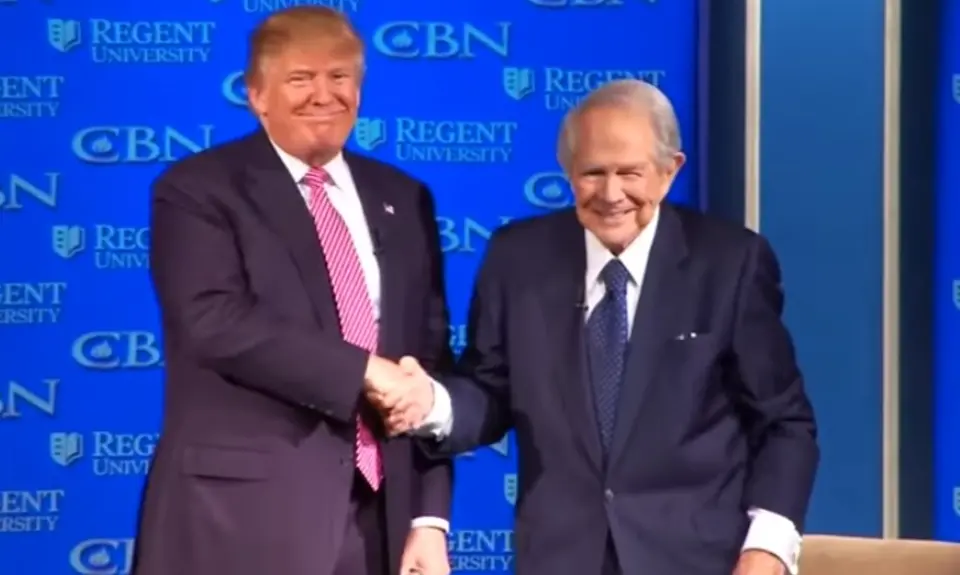For years, pundits have been predicting or declaring the end of the Religious Right as a political force. Some thought that Donald Trump’s Republican primary victory over a number of evangelical candidates was another sign of deep divisions in the movement that would doom it to declining influence. Well, not so fast.
Among the notable aspects of the 2016 presidential election campaign was Trump’s ardent courting of conservative evangelicals: He named one of their own as his running mate; he let them write their agenda into the Republican Party platform; he promised them the Supreme Court of their dreams; he pledged to make conservative Christians more politically powerful by eliminating legal restrictions on politicking by churches and other tax-exempt nonprofit organizations; he met with hundreds of Religious Right leaders and made repeated visits to their conferences and campuses.
In return, many Religious Right leaders, including “prophets” and dominionists who had previously existed mostly on the political fringes, rallied around Trump, declaring him anointed by God to fulfill various prophecies and destroy the demonic grip of political correctness on America. Groups like political operative Ralph Reed’s Faith and Freedom Coalition invested in massive persuasion and GOTV operations to convince Christian conservatives to back Trump.
The narrative of a divided evangelical community rested on a few high-profile leaders who remained firmly in the "Never Trump" camp. But in the end, white evangelicals gave Trump record-high support, surpassing their support for George W. Bush and Mitt Romney. “The Lord did this!” said former Rep. Michele Bachmann. The Church “showed up,” exulted Iowa Religious Right leader Bob Vander Plaats, who had engaged in a nasty public spat with Trump during the primaries, “The church heard the call to consider their vote an act of honoring God. And they confounded the establishment, the media, and the elite by showing up to vote like never before!”
Exit polls indicated that white evangelical or born-again Christians made up 26 percent of the electorate and that 81 percent of them voted for Trump, versus just 16 percent for Hillary Clinton. An election night survey asked voters how strongly on a scale of 1 to 10 they identified as a “supporter of the conservative Christian movement” and found that one-third of voters rated themselves an 8-10, with Trump winning their votes 79 percent to 15 percent.
At a press conference on the day after the election, Reed said that Trump’s embrace of Religious Right positions on abortion and traditional marriage, contrasted with Hillary Clinton’s embrace of Planned Parenthood and an LGBT equality agenda, brought a “tremendous level of moral clarity” to the race. He suggested that the future of the Supreme Court was the “sleeper issue” of the campaign.
But the data Reed distributed also undermined the notion that it was the Religious Right’s social issues that primarily motivated Trump voters. Asked which best summarized the reason they supported Trump, 55 percent of conservative Christians said it was because “he will bring real change to Washington” compared to 20 percent who said it was because of shared moral values/beliefs and 18 percent who said it was because Trump shares their views on issues. Among Trump voters overall, 60 percent said they were voting for “change” while 20 percent said they chose him because of his views on issues and 14 percent said his moral beliefs and values.
Of course, that support came in spite of Trump’s well-publicized moral failings, as Religious Right leaders abandoned previously stated concerns over a president’s character in order to support someone who they believe would advance their political agenda. One of the other members of Trump’s winning coalition, white nationalist Richard Spencer, archly tweeted after the election, “In the end, evangelical Christianity was an implicitly White *culture* much more than it was a theology or politics.”
Conservative Catholics have been Religious Right allies in opposition to reproductive rights and LGBT equality, and Trump reportedly won the votes of 54 percent of white Catholics. An article on Catholic site Crux commented that “it’s safe to say that once again, rumors of the demise of religion as a voting issue have been greatly exaggerated.”






